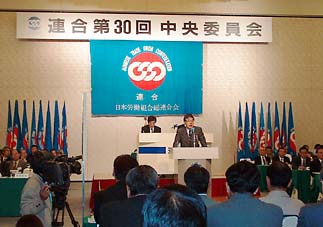|
Photo:"Gain the supplementary budget through employment," says President Washio. (Aomori, June 29)
 From
June 29 - 30, the 30th RENGO Central Committee Meeting was held at a
hotel in Aomori where RENGO's policies for the 6th Convention were established
and refined. The Central Committee endorsed the "Spring Struggle
Summary 99," "Establishment of the RENGO Political Affairs
Center," and adopted the appeal, "Unions Must Take a Stand
Now." The unitary 1999 Spring Struggle position was also disbanded. From
June 29 - 30, the 30th RENGO Central Committee Meeting was held at a
hotel in Aomori where RENGO's policies for the 6th Convention were established
and refined. The Central Committee endorsed the "Spring Struggle
Summary 99," "Establishment of the RENGO Political Affairs
Center," and adopted the appeal, "Unions Must Take a Stand
Now." The unitary 1999 Spring Struggle position was also disbanded.
President Washio was the first speaker who, before discussing fundamental ideas on six items, criticized the Economic Planning Agency's new economic plan calling it "not a direction that the public can choose with confidence and security."
Speaking on employment measures he stated that "according to the Labor Survey released June 30, there has been no change in the severity of employment conditions. We demand that the extended Diet immediately implement emergency employment measures and a supplementary budget." He proceeded to display a list of numbers by topic in the \14 trillion proposed supplementary budget.
Washio clarified his stand on future Spring Struggles stating "we encourage macro level employment/wage agreements, micro level non-cumulative minimum wage systems, and a move away from separate labor/management relations at individual companies" should be studied if we "can guarantee a formal agreement system for all society."
With regard to labor legislation, he expressed his "thorough discontent" at the passing of the Dispatched Labor Law Amendment, and his resolution "to work hard to establish a comprehensive social security system" for pension/health care/family care problems.
Washio expressed his concern over three questionable wire-tapping bills (these would give the right to law enforcement agencies to wiretap in criminal investigations) that recently passed through a committee in the House of Representatives before their respective threats and risks were sufficiently brought to light. He also "could not help feeling dubious" about the call for the installment of "Hinomaru" and "Kimigayo" as Japan's national flag and anthem and stressed it is critical that "both need careful discussion in order to build a national consensus. We oppose legislation of those bills in the current diet session."
He further pointed out that RENGO's political policy drew closer toward the unification of its constituents due to the revision of the following clause, "each constituent organization is in charge of relations between themselves and political parties."
Washio maintained that the "three-party alliance line (the Liberal Democratic Party's coalition with the Liberal Party and the New Komeito Party) is in obvious opposition to RENGO policy" and called on other opposing parties to unite against them. Should the three-party alliance become overtly oppositional, he suggested that future "election cooperation both with the Liberal Party and the New Komeito Party would be extremely difficult."
The activity report was endorsed at the meeting following remarks from the Japan Federation of Telecommunications, Electronic Information and Allied Workers, RENGO Shizuoka, the Japan Confederation of Railway Workers' Unions, the All-Japan Water Supply Workers' Union, and the All Japan Garrison Forces Labor Union.
Several bills were endorsed after hearing opinions from the Japan Federation of Leisure, Service Industries Workers' Unions and the National Union of General Workers for the 'Spring Struggle Conclusion,' the Japan Teachers' Union, RENGO Osaka, the Japanese Federation of Textile, Garment, Chemical, Mercantile, Food and Allied Industries Workers' Unions, the Japan Railway Trade Unions Confederation for the 'Demands and Proposals for Policies/Systems' and the All-Japan Prefectural and Municipal Workers' Union for the 'Compilation of the Supplementary Budget.' |
 From
June 29 - 30, the 30th RENGO Central Committee Meeting was held at a
hotel in Aomori where RENGO's policies for the 6th Convention were established
and refined. The Central Committee endorsed the "Spring Struggle
Summary 99," "Establishment of the RENGO Political Affairs
Center," and adopted the appeal, "Unions Must Take a Stand
Now." The unitary 1999 Spring Struggle position was also disbanded.
From
June 29 - 30, the 30th RENGO Central Committee Meeting was held at a
hotel in Aomori where RENGO's policies for the 6th Convention were established
and refined. The Central Committee endorsed the "Spring Struggle
Summary 99," "Establishment of the RENGO Political Affairs
Center," and adopted the appeal, "Unions Must Take a Stand
Now." The unitary 1999 Spring Struggle position was also disbanded.